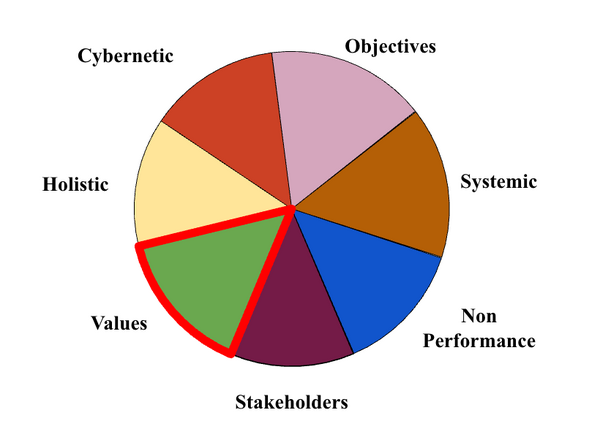Performance by Values: Difference between revisions
(Created page with "right|600px Individual preferences and values offer a distinct way to analyse an organization’s performance compared to other approaches on systems and objectives. At an individual level, values are typically defined as the fundamental principles, beliefs, and ideals that a person holds as important in their life. At an organizational level, they are the set of core beliefs and principles that an organization considers important to guid...") |
mNo edit summary |
||
| Line 1: | Line 1: | ||
[[File:Performance_Values.png|right|600px]] | [[File:Performance_Values.png|right|600px]] | ||
Individual preferences and values offer a distinct way to analyse an organization’s performance compared to other approaches on systems and objectives. | |||
At an individual level, values are typically defined as the fundamental principles, beliefs, and ideals that a person holds as important in their life. At an organizational level, they are the set of core beliefs and principles that an organization considers important to guide its actions, decisions, and social behavior. In both cases, values | Performance by values is one of seven approaches used to manage individual and organizational performance that we've identified at GRI. Individual preferences and values offer a distinct way to analyse an organization’s performance compared to other approaches on systems and objectives. | ||
At an individual level, values are typically defined as the fundamental principles, beliefs, and ideals that a person holds as important in their life. At an organizational level, they are the set of core beliefs and principles that an organization considers important to guide its actions, decisions, and social behavior. In both cases, the concept of values includes broad aspects of social behaviors that can be observed and compared at both the individual and organizational levels. | |||
Revision as of 20:34, 6 August 2025
Performance by values is one of seven approaches used to manage individual and organizational performance that we've identified at GRI. Individual preferences and values offer a distinct way to analyse an organization’s performance compared to other approaches on systems and objectives.
At an individual level, values are typically defined as the fundamental principles, beliefs, and ideals that a person holds as important in their life. At an organizational level, they are the set of core beliefs and principles that an organization considers important to guide its actions, decisions, and social behavior. In both cases, the concept of values includes broad aspects of social behaviors that can be observed and compared at both the individual and organizational levels.

